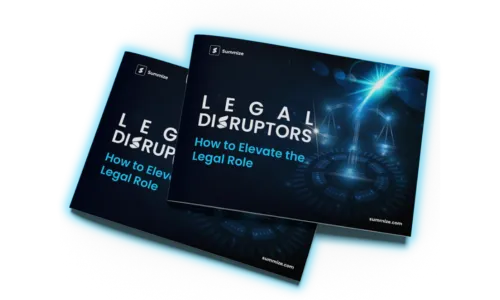The human side of AI
On the first episode of the Legal Disrupters Podcast, Tom Dunlop & Sam Walkley discuss the human side of AI and the latest developments in legal tech.
April 19, 2022
December 11, 2025
In the latest episode of our Legal Disrupters, host Graham Smith introduces a compelling conversation between Sam Walkley, founder of XVO Legal, and Tom Dunlop, CEO of Summize. Together, they explore the evolving relationship between legal services, technology, and the people who deliver them.
Sam, a former commercial solicitor with experience across major brands including Volkswagen, Müller, O2, and Jaguar Land Rover, brings deep insight into both traditional private practice and modern client expectations. Tom brings the perspective of a legal tech innovator reshaping how digital contracting gets done. Their discussion highlights not just the future of AI and legal technology, but the importance of reframing legal services around accessibility, efficiency, and genuine client care.
The misalignment of traditional legal models
Sam described his early experience in private practice, where success was defined by billable hours rather than client outcomes. Being efficient, ironically left him “behind on his figures.” He questioned why legal services operate differently from other industries, where service is measured by speed, clarity, and value. This disconnect ultimately influenced his move toward building a more modern, client-focused model with XVO Legal.
An untapped SME market hungry for accessibility
A recurring theme was the large number of SMEs that avoid legal advice, not because they don’t need it, but because the process feels expensive, opaque, and unapproachable. Sam shared the example of a pyrotechnics company handling a seven-figure contract for a global pop star tour. They had never previously worked with lawyers on contract review, and only after seeing the risk exposure did they realize the value of legal input.
This highlighted a vast opportunity: a market that knows legal matters are important but often avoids engagement until it’s too late.
Legal tech as a time-saver, not a threat
Sam and Tom explored the narrative that legal tech either fully replaces lawyers or offers no meaningful efficiency. But the truth sits in the middle. Tools like AI-powered contract review can remove repetitive work, standardize processes, and give clients clarity. Sam emphasized that “great legal tech won’t replace a great lawyer, but great legal tech in the hands of a great lawyer is game-changing.”
However, lawyers must be proactive: those who embrace technology can enhance their service; those who resist risk being left behind.
The debate on trust, accountability, and regulation in AI
The pair tackled complex questions about the future of AI in legal decision-making. Using the analogy of driverless cars, Sam posed the dilemma: if AI leads to a contract issue, who’s responsible? While fintech faces regulatory scrutiny of automated decision-making, legal AI remains largely in its infancy.
Sam’s view is that AI can dramatically assist, but cannot be treated as plug-and-play. Human oversight, judgement, and relationship-building remain irreplaceable. Responsibility will always sit partly with the user, not just the system.
Returning to service as the heart of legal practice
Despite the rise of AI and automation, Sam believes the future of legal services lies in getting back to basics: putting clients first, focusing on quality of service, being accessible and available, and delivering to cost and on time. Tech may accelerate the future of legal operations, but the human elements, trust, communication, and relationship, will define which lawyers continue to thrive.
Listen to the full podcast discussion at the start of the blog, and to hear from even more of our Legal Disruptors, explore the Legal Disruptors Hub.
Discover even more!
Explore more about contracting and CLM in our ultimate contract guides








